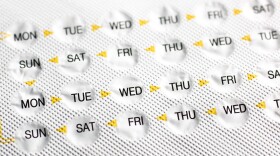
Allison Aubrey
Allison Aubrey is a correspondent for NPR News, where her stories can be heard on Morning Edition and All Things Considered. She's also a contributor to the PBS NewsHour and is one of the hosts of NPR's Life Kit.
Along with her NPR science desk colleagues, Aubrey is the winner of a 2019 Gracie Award. She is the recipient of a 2018 James Beard broadcast award for her coverage of 'Food As Medicine.' Aubrey is also a 2016 winner of a James Beard Award in the category of "Best TV Segment" for a PBS/NPR collaboration. The series of stories included an investigation of the link between pesticides and the decline of bees and other pollinators, and a two-part series on food waste. In 2013, Aubrey won a Gracie Award with her colleagues on The Salt, NPR's food vertical. They also won a 2012 James Beard Award for best food blog. In 2009, Aubrey was awarded the American Society for Nutrition's Media Award for her reporting on food and nutrition. She was honored with the 2006 National Press Club Award for Consumer Journalism in radio and earned a 2005 Medical Evidence Fellowship by the Massachusetts Institute of Technology and the Knight Foundation. In 2009-2010, she was a Kaiser Media Fellow.
Joining NPR in 2003 as a general assignment reporter, Aubrey spent five years covering environmental policy, as well as contributing to coverage of Washington, D.C., for NPR's National Desk. She also hosted NPR's Tiny Desk Kitchen video series.
Before coming to NPR, Aubrey was a reporter for the PBS NewsHour and a producer for C-SPAN's Presidential election coverage.
Aubrey received her Bachelor of Arts degree from Denison University in Granville, Ohio, and a Master of Arts degree from Georgetown University in Washington, D.C.
-
Sunscreen is crucial for skin protection and the SPF is important. But dermatologists say the key to good summer skin care is applying plenty of lotion and re-applying it often, even when it's cloudy.
-
Updated COVID boosters are now available for anyone age 12 or older. The CDC is urging anyone who is eligible to sign up but some vaccine experts say some people might want to wait.
-
The way many Americans eat is fueling chronic disease. Here are seven big ideas from the White House's upcoming nutrition conference for how to improve Americans' diets.
-
Some object to paying for health insurance plans that cover preventive services that they say violate their religious beliefs, which could cause millions to lose access to care if the courts agree.
-
Birth control pills are available in the U.S. only with a prescription. Now a drugmaker is asking the FDA to approve a progestin-only contraceptive that would be available without one at pharmacies.
-
BA.5 is now the dominant omicron strain in the U.S. It's good at evading the immune system, though doesn't appear to cause more serious illness.
-
The death of children, shot at school, is hard to comprehend. It can be even harder for kids. Counselors say parents should take cues from their kids, listen to their fears and answer their questions.
-
Most of us will eventually get COVID but that's not an invitation to party with omicron. Here's why you might want to hang onto your mask and keep cautious a little longer.
-
Your college kid just got home and may be a bit jaded about COVID. But your coming holiday visit could be a real risk to grandparents. Here's how one mom is getting through to her sons about safety.
-
Intergenerational indoor gatherings, a.k.a, Thanksgiving dinner, still pose a COVID risk to older adults and the immunocompromised. Here's how to keep everyone safe.










